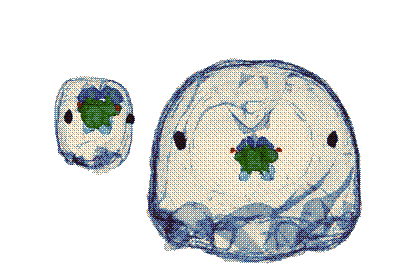
I've long valued my inner life as much as my experiences with the physical world. Thinking about the world, my place in it, and my relationships to the people around me, before me, and after me is a favorite activity of mine. Lately, however, I find my focus shifting to the inner life of nonhumans, questioning how rich of one they might enjoy. Surely, the inner life isn't a monopoly of humanity. For example, humans have a propensity for warfare. The thoughtful among us have long agonized over this fact. There are many animals that commit similar acts of war, from other primates such as chimpanzees to insects such as ants. Chimpanzees are a little too similar to us. It’s easy to imagine that their thought processes may mirror our own, but what about ants? Does an ant contemplate their existence as cannon-fodder? Could one realize the futility and waste of war? Might one curse their species for forcing their sacrifice rather than finding some way to coexist with their enemies?
Just as metaphors are helpful in digesting difficult concepts, it is helpful to think of human actions in comparison with our animal cousins. We believe ourselves to be unique among the animals, but our uniqueness is more a perception born of ignorance than a reality.
Through this comparison, it becomes much easier to accept just how insignificant we are in the grand scheme. After all, we were conditioned to think very little of the ant. Yet, they have inhabited the Earth for as long as we have. With an estimated population of 20 quadrillion, they far outnumber us. They're arguably the more successful animal, even beating us to agriculture by about 50 million years (seriously, look up " leafcutter ant"). Furthermore, they've managed to reach this success without leaving the planet in such a disgraceful state. Yet, we wipe away entire colonies without a semblance of guilt. We may profess the importance of human life, but we often treat human life just as cheaply.
We are a species so stupefied by our cleverness that we cannot conceive of the wisdom of the world around us. A clever animal might be able to recognize and utilize the Earth's store of fossil carbon to their benefit. It takes a wise one to leave it be.
Us clever apes are releasing carbon at a rate that is 200 times the pace of volcanic eruptions that led to some of the Earth’s worst mass extinctions. We add 5 atomic bombs worth of energy to our oceans each second. Nearly 70% of biodiversity has been lost since 1970. Humans and our livestock make up 96% of the mammalian biomass currently alive. Despite these realities, we busy ourselves with meaningless distractions.
Both humans and ants are violent species, but no organism (except for maybe cyanobacteria, see “The Great Oxidation Event”) has done a fraction of the damage that we have caused over the last 200 years. While ants have existed in their form for nearly 100 million years, we have only existed as homo sapiens for a mere 300,000. The oldest hominin dates back maybe 7 million years at the most. We're now on a path that ensures our species will be little more than a blip in time. If we're remembered at all, it will be from the layer of waste wedged between layers and layers of rock. Our egos won’t survive. Nor will our bodies. They will decay and be reconstructed countless times just as all life. Atoms of our flesh may even one day compose the cells of an ant.
So, why and for what are we fighting? We must look beyond the illusion we've created in our image if there is any hope of preserving a habitable planet. We must set aside our differences and begin acting for the benefit of all life, not just for ourselves, our wants, and our conveniences. We must change. It is unavoidable. We can either adapt by choice or by force. The Earth won’t allow us to stall much longer.